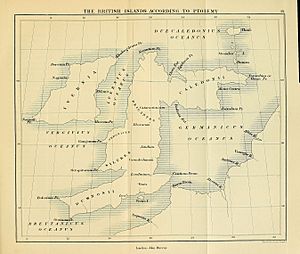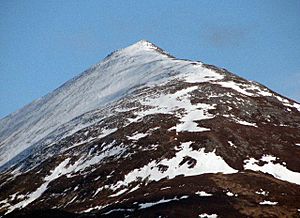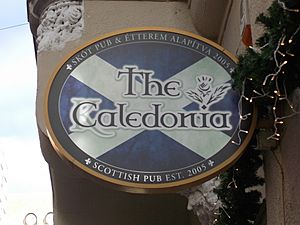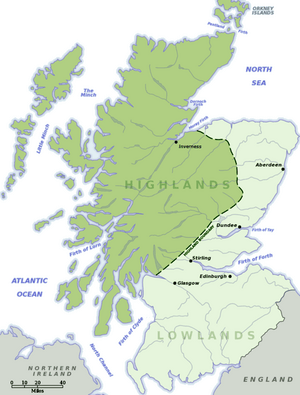Caledonia facts for kids

Caledonia was the old Latin name the Roman Empire used for the northern part of Great Britain. This area mostly covers what we now call Scotland. Today, people often use "Caledonia" as a poetic or romantic name for all of Scotland.
During the time the Romans were in Scotland, the area they called Caledonia was separated from the rest of the island by a big wall called the Antonine Wall. The Romans tried to conquer Caledonia many times. However, unlike other parts of Britain, Caledonia was never fully controlled by the Roman Empire.
Ancient Roman writers, like Tacitus and Cassius Dio, wrote about Caledonia. They said it was home to tribes like the Maeatae and the Caledonians. The name "Caledonia" likely comes from an old Celtic language word.
Contents
History of the Name
What Does "Caledonia" Mean?
The name Caledonia probably comes from the name of a tribe called the Caledones. Some experts think this name means "possessing hard feet." This might suggest they were strong or tough people. Others believe it relates to the Welsh word caled, which means "hard." This could describe the rocky land or the hardy people who lived there.
Where Can We Still See the Name?
The name of the Caledonians can still be found in some place names today. For example, the Scottish town of Dunkeld is called Dùn Chailleann in Scottish Gaelic. This means "fort of the Caledonii." Also, the mountain Sìdh Chailleann means the "fairy hill of the Caledonians."

Some old stories, like the Historia Brittonum, mention a forest in Scotland called Coit Celidon. This was said to be the site of a battle involving the mythical King Arthur. The name Caledonia might be linked to the Caledonii, who were a large and possibly dominant tribe in the area.
Caledonia Today
A Poetic Name for Scotland
Today, "Caledonia" is used in English and Scots as a historical term for northern Britain during Roman times. It's also a popular romantic or poetic name for Scotland as a whole.

Famous Uses of the Name
Many groups and businesses have used the name "Caledonia." Here are some examples:
- Universities: Glasgow Caledonian University
- Transport: The ferry company Caledonian MacBrayne, the old British Caledonian airline, and the Caledonian Sleeper train service from London to Scotland.
- Sports: Inverness Caledonian Thistle F.C. is a professional football club.
- Music: "Caledonia" is a very popular Scottish patriotic song. It was written by Dougie MacLean in 1977 and has been sung by many artists.
The ancient writer Ptolemy also wrote about the Caledonia Silva, which means "Caledonian Forest." This idea is still remembered today as the "Caledonian Forest," even though the forests are much smaller now than in Roman times.
Some experts note that the name "Scotland" actually comes from Scotia. This was a Latin term first used for Ireland and later for Scotland. This is because the Scoti people originally came from Ireland and settled in Scotland. Another Roman name for the island of Great Britain was Albion, which is similar to the Scottish Gaelic name for Scotland: Alba.
The name Caledonia is also sometimes used to describe New Caledonia in English. This is similar to how it's used in French (La Nouvelle-Calédonie). For example, New Caledonia's trade department uses the slogan “Choose Caledonia.”
See also
- Battle of Mons Graupius
- Caledonian Ocean
- Caledonia Waterfalls
 | Victor J. Glover |
 | Yvonne Cagle |
 | Jeanette Epps |
 | Bernard A. Harris Jr. |


